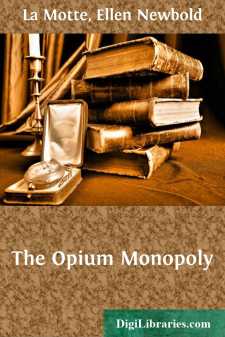Categories
- Antiques & Collectibles 13
- Architecture 36
- Art 48
- Bibles 22
- Biography & Autobiography 813
- Body, Mind & Spirit 142
- Business & Economics 28
- Children's Books 17
- Children's Fiction 14
- Computers 4
- Cooking 94
- Crafts & Hobbies 4
- Drama 346
- Education 46
- Family & Relationships 57
- Fiction 11829
- Games 19
- Gardening 17
- Health & Fitness 34
- History 1377
- House & Home 1
- Humor 147
- Juvenile Fiction 1873
- Juvenile Nonfiction 202
- Language Arts & Disciplines 88
- Law 16
- Literary Collections 686
- Literary Criticism 179
- Mathematics 13
- Medical 41
- Music 40
- Nature 179
- Non-Classifiable 1768
- Performing Arts 7
- Periodicals 1453
- Philosophy 64
- Photography 2
- Poetry 896
- Political Science 203
- Psychology 42
- Reference 154
- Religion 513
- Science 126
- Self-Help 84
- Social Science 81
- Sports & Recreation 34
- Study Aids 3
- Technology & Engineering 59
- Transportation 23
- Travel 463
- True Crime 29
The Opium Monopoly
Categories:
Description:
Excerpt
INTRODUCTION
We first became interested in the opium traffic during a visit to the Far East in 1916. Like most Americans, we had vaguely heard of this trade, and had still vaguer recollections of a war between Great Britain and China, which took place about seventy-five years ago, known as the Opium War. From time to time we had heard of the opium trade as still flourishing in China, and then later came reports and assurances that it was all over, accompanied by newspaper pictures of bonfires of opium and opium pipes. Except for these occasional and incidental memories, we had neither knowledge of, nor interest in the subject. On our way out to Japan, in the July of 1916, we met a young Hindu on the boat, who was outspoken and indignant over the British policy of establishing the opium trade in India, as one of the departments of the Indian Government. Of all phases of British rule in India, it was this policy which excited him most, and which caused him most ardently to wish that India had some form of self-government, some voice in the control and management of her own affairs, so that the country could protect itself from this evil. Without this, he declared, his country was powerless to put a stop to this traffic imposed upon it by a foreign government, and he greatly deplored the slow, but steady demoralization of the nation which was in consequence taking place. As he produced his facts and figures, showing what this meant to his people—this gradual undermining of their moral fiber and economic efficiency—we grew more and more interested. That such conditions existed were to us unheard of, and unbelievable. It seemed incredible that in this age, with the consensus of public opinion sternly opposed to the sale and distribution of habit-forming drugs, and with legislation to curb and restrict such practices incorporated in the laws of all ethical and civilized governments, that here, on the other side of the world, we should come upon opium traffic conducted as a government monopoly. Not only that, but conducted by one of the greatest and most highly civilized nations of the world, a nation which we have always looked up to as being in the very forefront of advanced, progressive and humane ideals. So shocked were we by what this young Hindu told us, that we flatly refused to believe him. We listened to what he had to say on the subject, but thinking that however earnest he might be, however sincere in his sense of outrage at such a policy, that he must of necessity be mistaken. We decided not to take his word for it, but to look into the matter for ourselves.
We did look into the matter. During a stay in the Far East of nearly a year, in which time we visited Japan, China, Hongkong, French Indo-China, Siam and Singapore, we looked into the matter in every country we visited. Wherever possible we obtained government reports, and searched them carefully for those passages giving statistics concerning the opium trade—the amount of opium consumed, the number of shops where it was sold, and the number of divans where it was smoked....





